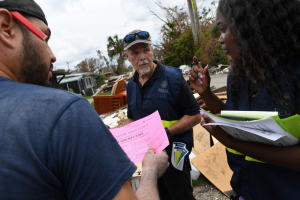
Disaster Survivor Assistance team members speak with residents in neighborhoods impacted by Hurricane Ian. (FEMA photo by Jocelyn Augustino)
Tragedy, while devastating, can help us understand shortcomings in our disaster response and adjust accordingly. That’s exactly what happened in the wake of the tragic Surfside Condo Collapse. When the smoke cleared and the rubble settled, 98 people had lost their lives, and Rebecca Fishman Lipsey saw a call to action. Fishman Lipsey is the CEO of the Miami Foundation, a backbone in the local community, and she immediately set to work using her influence and position to help those affected by the devastating collapse. But as she began to assess the needs of her struggling neighbors, she found heaps of work and red tape that could be handled preemptively, to save everyone precious response time – and money. She voiced her frustrations with the lengthy waits for help to arrive even after her tireless efforts, telling the Associated Press, “I cannot wait six weeks for the check to clear. I need everybody’s ACH information already. I need to know what supplies people need, before the disaster.” And just like that, she began working to set up the Miami Disaster Resilience Fund: a permanent, revolving fund to help with such immediate crises.

Rebecca Fishman Lipsey, CEO, Miami Foundation. Courtesy, Miami Foundation
This permanent fund means that money is ready before and right after a storm, circumventing logistical and bureaucratic problems that have long plagued this process. Several key partnerships have been established to ensure a strong foundation, including help from Citadel and the Miami Heat. In the last year, the fund grew 17% to about $8 million – almost an extra million for this new storm season we’re now in, that no one had to wait to donate. The Miami Foundation also established agreements with non-profits so that when the storm does hit, they can immediately begin to supply basic needs such as food, medicine, and shelter to those affected. Patty McIlreavy, president and CEO of the Center for Disaster Philanthropy, told the AP that this is imperative to a better system. “There is space across all types of philanthropic entities to explore how you set money aside for this and to be much more proactive,” she said. “We need all types of foundations to explore the realities of the disasters that are coming for communities.” Such sentiments have been matched by many other philanthropic organizations in Miami. Other cities, such as Stuart, Florida are launching their own permanent disaster funds.
Like a good disaster plan, it all hinges on being proactive, according to these thought leaders – extra funding, even a couple hundred dollars, can make a huge impact on a non-profit’s ability to staff and stock for such an event. Currently, there’s steps already being taken across communities for our expected historical hurricane season, including sending out hurricane kits, and a round of proactive grants to supply vital information as well as sandbags, tarps, and other protective measures to Floridians. It’s time for the Sunshine State to batten down the hatches and start planning our responses before the storm clouds even appear.
See you on the trail,
Lisa

